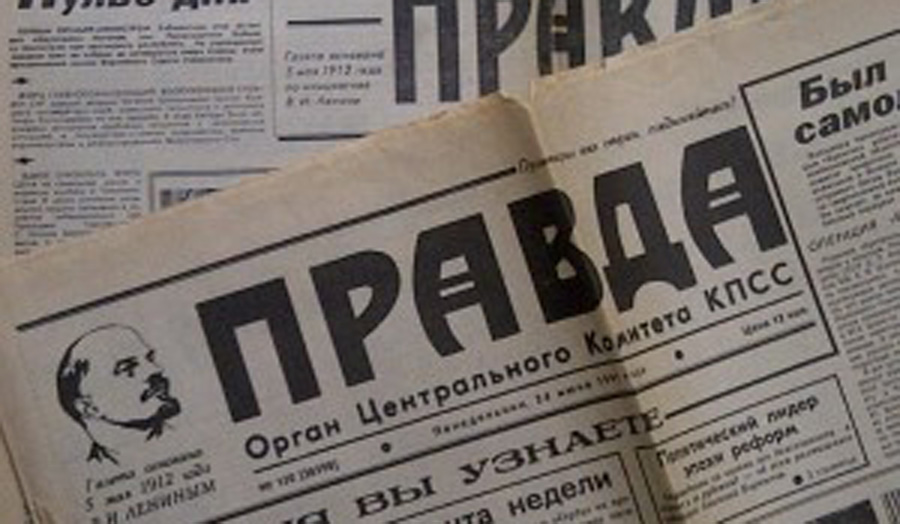Date: 15.05.2012
One of Dmitry Medvedev’s final acts as Russian President – a post from which he formally stepped down last week – was to announce the setting up of a public television channel in Russia.
The Moscow Times said that Mr Medvedev had ‘vowed’ the proposed channel would be ‘fully independent from the state’ – but both it and RIA Novosti also noted that the Kremlin would appoint the editor-in-chief (and, presumably, retain the right to dismiss said editor).
Even with this questions over the new channel’s independence, it still marks a change in Russian media policy: perhaps not in substance – at least not yet – but in presentation at least.
Media, politics, and power have followed parallel paths in post-Soviet Russia. Searching through some old papers the other day, I came across a stark example. I found two yellowing copies of Pravda: one from the summer of 1991, the second from January 1992. One difference is easy to spot. Lenin has disappeared from the masthead. Between the publication of the two issues, the system he created had collapsed.
As the 1990s wore on, Russia’s brutal form of capitalism was imprinted on the press, too. Where once the price of a newspaper had been displayed on the front cover, there now appeared the phrase ‘retail price to be agreed’. Everything was up for sale; everything negotiable. Twenty years later, the phrase sums up the age almost as much as the news items from the time.
Yet this was an era when muck-racking, scandal-mongering (in the best senses of those words) reporting flourished. You could say anything in the papers. April fool stories appeared for the first time. I seem to remember, though, a sad letter to one tabloid from a provincial primary school teacher who had brought her class to Moscow to see the mammoth in the zoo – a good Soviet citizen, she had not understood that the papers could lie, especially in jest.
It was also the age when later evils began to take root. The murder in 1994 of Dmitry Kholodov, who was investigating corruption in the military, set the precedent for later killings of journalists with impunity.
The media’s role of Russia’s first post-Soviet presidential election, in 1996, saw oligarchs and the political establishment combine to ensure that the popular vote could not bring a communist comeback – as a truly free and fair poll might then have done.
The chaos of the immediate post-Soviet period - with all its highs and lows – was being brought under control. The first decade of the new century saw the oligarchs flee, become friends of the Kremlin, or, at least, keep quiet. Russia’s most influential medium, television, reflected the new reality. Independent voices were rare; dissenting ones all but absent.
The new plan to create an ‘independent’ channel is a new departure, although not perhaps for the reasons which Mr Medvedev outlined.
‘I expect the channel to be of interest, at least to those who are interested in public life, because tastes differ and everyone has various expectation of TV content. But to audience of that type, a demanding audience, this channel would be of interest, I hope,’ RIA Novosti quoted him as saying in April.
It is of significance because it shows that the recent protests prompted by dissatisfaction with Russia’s parliamentary and presidential elections have prompted some kind of response.
Vladimir Putin has returned to the Presidency at a time unlike any other in his twelve years at the top of Russian politics. Sustained mass protest, or a widely hostile press, seem distant prospects – but a return to small, symbolic demonstrations and media with the mute button on seems unlikely too.
It will now be up to Mr Putin, not his predecessor, to decide the future of the public TV project. Like previous, post-Soviet, presidential initiatives to strengthen the rule of law in Russia, or curb corruption, though, it already looks like too little, too late.

